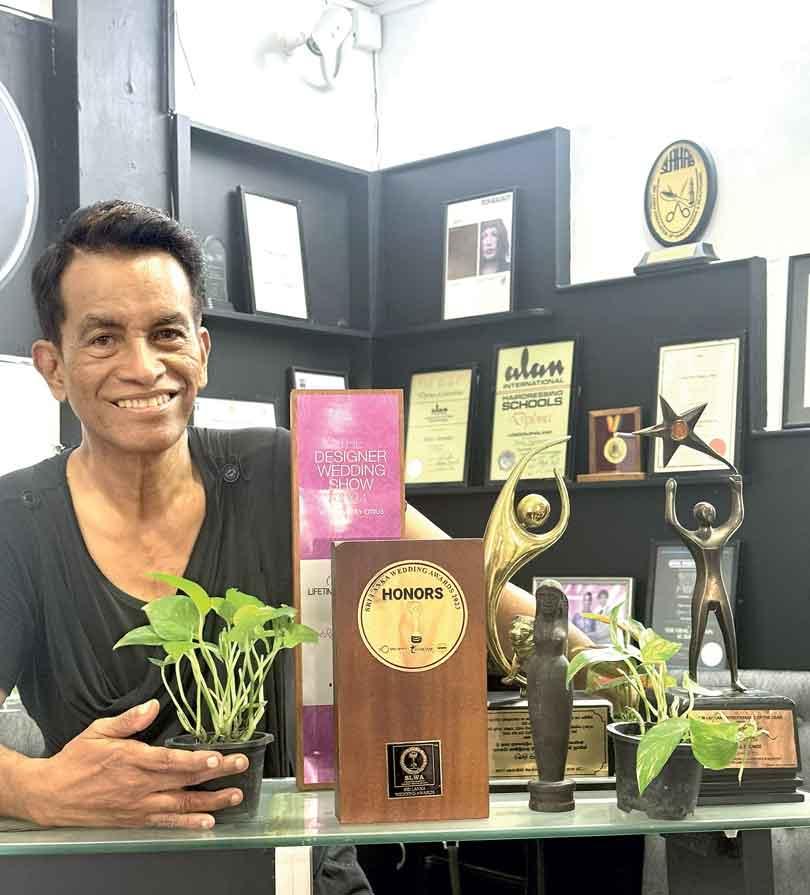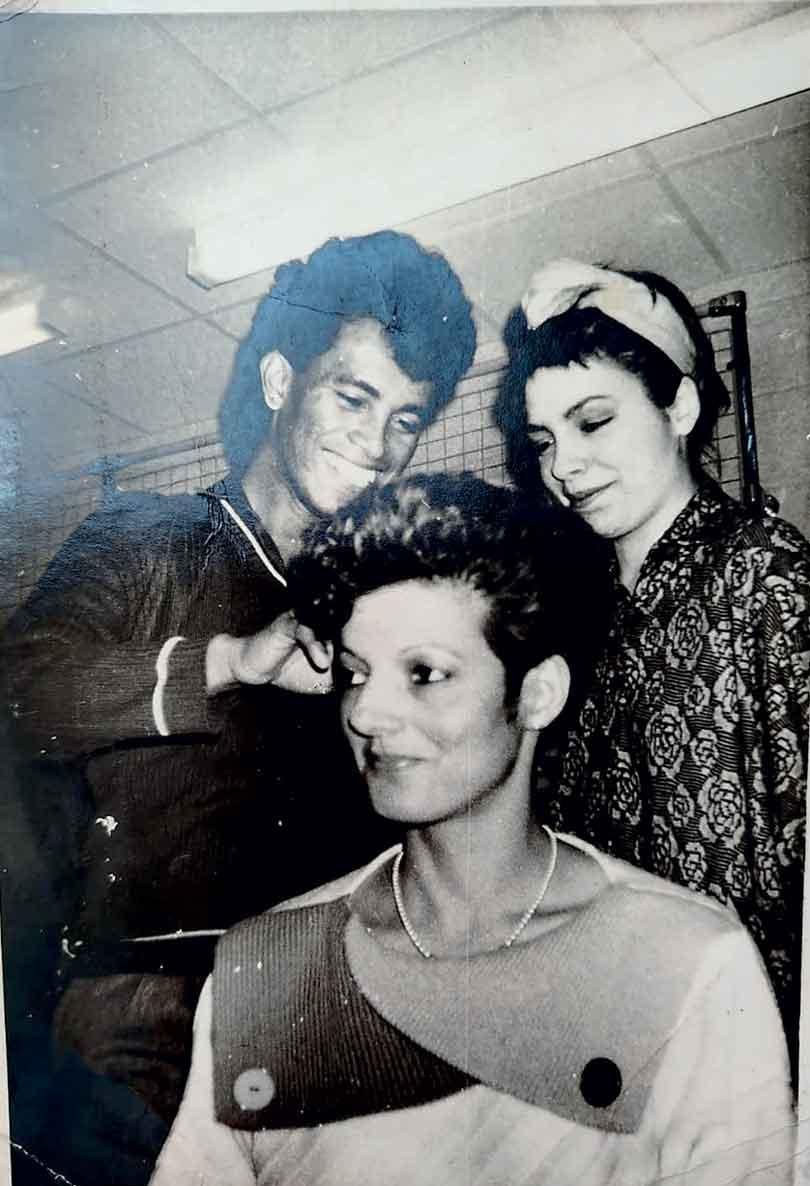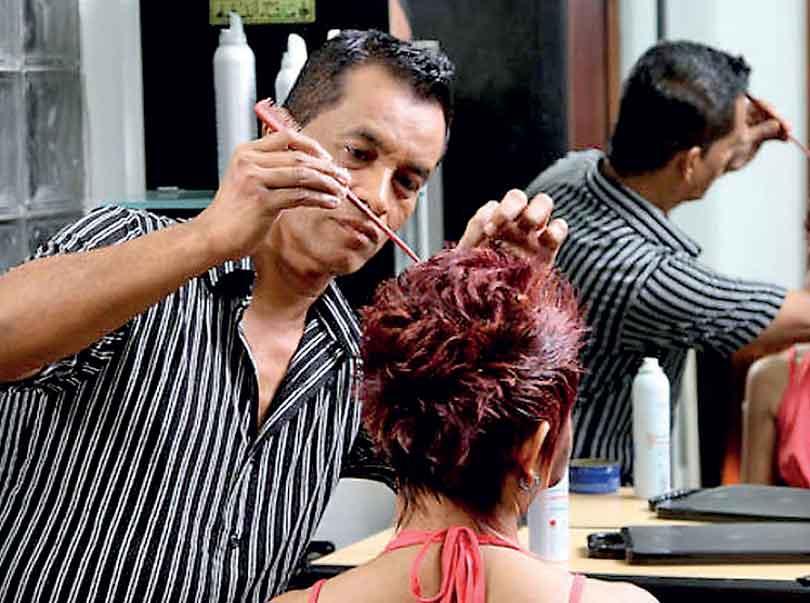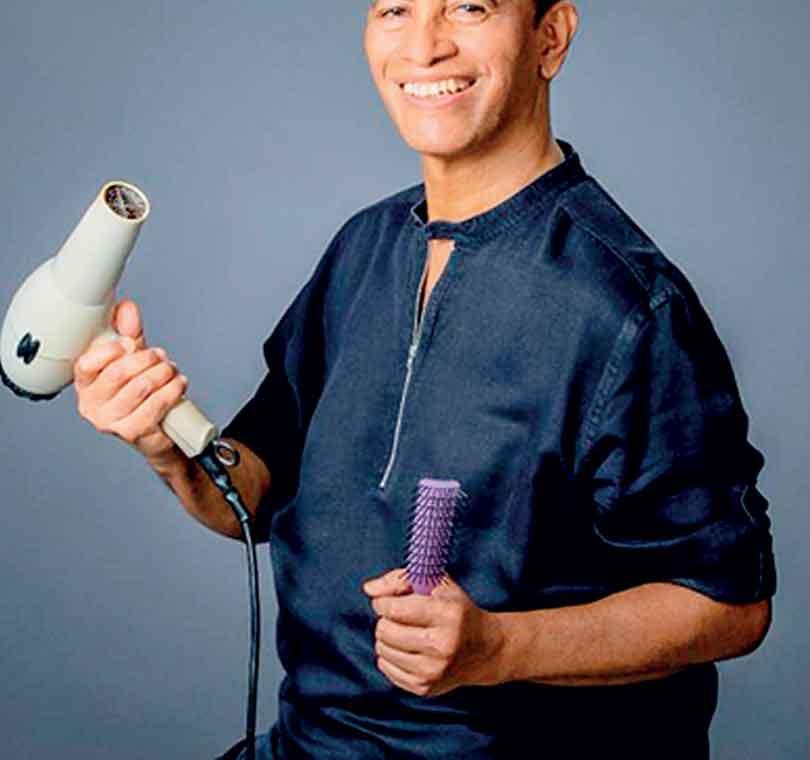




There was tea on the table and pastries still warm. He had been expecting me but not in the way most people prepare for interviews. No notes. No handlers. No curated version of his story waiting to be told. Just Ramzi. Entirely himself. Completely present. This is how all stories with meaning begin, with people who remember who they are.
Ramzi Rahaman was born in Colombo, into a Malay household of seven children, six boys and one girl. He came of age in a world that didn’t always know what to make of boys like him: sensitive, observant, moved by beauty, texture, and detail. While others played cricket or built careers in more “respectable” paths, Ramzi watched women transform, brushing their hair, pinning it with grace, powdering their cheeks with talcum and jasmine.
“I wasn’t interested in toys or boys' games,” he tells me with a soft smile. “I used to get mesmerized watching my aunts brush their hair or wear a sari. That was my childhood, learning without knowing I was learning.”
In school, he didn’t shine in the conventional way. Math and science never spoke his language. But art did. Form did. Silence did. He found beauty where others didn’t look and held onto it with quiet defiance. His father, an accountant, saw his son’s artistic potential and, despite financial strain, enrolled him for painting lessons with the renowned Ivor Baptiste. But it was his maternal grandmother’s long, coiled hair that captured his heart most. She was the first canvas. The first muse. He had watched her do his mother’s hair.
It wasn’t an easy path. In 1970s Ceylon, beauty salons were ruled by women Salon Moira, Janet Dias, Gladys. There were no roadmaps for a boy with a dream of becoming a hairdresser. And yet, Ramzi persisted. He became the only male student in a class full of women and topped the batch. He credits his first mentor, Logi, for giving him a seat at the table when no one else would.
He didn’t start with mirrors lined in bulbs or floors swept by assistants. He started with what he had. With empty beer cans for bun molds and socks cut into rollers. With soda cans turned curlers. With whatever he could find, because there was no YouTube to teach him and no salons waiting to hire him. Only instinct. Only fire.
“There was no internet. No Instagram. But I had imagination and determination. That was enough.” Ramzi attended several schools growing up before going on to study at the Morris School of Hairdressing and Vidal Sassoon in London, along with other leading institutions around the world, returning with skill sharpened and spirit unbroken. In a modest space on Barnes Place, with equipment borrowed and beauty products nearly impossible to find during economic hardship, he began. He used stale beer for setting. He improvised with elegance. And the clients came. They came because he made them feel seen.
He styled his first high profile bride with love, not strategy. Over the years, his mirror would reflect some of Sri Lanka’s most prominent faces. First Ladies Chandrika Bandaranaike Kumaratunga and Shiranthi Rajapaksa, beauty queen Rosy Senanayake, actresses, diplomats, and women from every walk of life. But fame was never his destination. Connection was.
“You don’t know what a woman is going through,” he says. “Sometimes, she walks into my salon after losing everything, her hair, her husband, her self-worth. When she walks out, I want her to feel whole again.” That became his quiet revolution. In a world that saw hairdressing as vanity, Ramzi saw it as healing. He never rushed. He never delegated. Even now, decades into his career, he chooses his clients carefully preferring silence, working one person at a time. He listens. He notices. He restores.
Ramzi never had a business plan. Never wanted to be a “brand.” And yet, he became one beautifully, organically, without ever losing what mattered. He trained others, many of whom now own successful salons across the globe. But he didn’t just teach them to style. He taught them to see. To care. To touch with dignity. He opened salons that felt more like living rooms than fashion houses. Spaces where women weren’t judged by their clothes or careers, but welcomed with tea, a story, and the chance to feel beautiful again. Often, he would reject celebrity requests and choose to style someone unknown, if he felt she truly needed him.
spirit unbroken. In a modest space on Barnes Place, with equipment borrowed and beauty products nearly impossible to find during economic hardship, he began. He used stale beer for setting. He improvised with elegance. And the clients came. They came because he made them feel seen.
He styled his first high profile bride with love, not strategy. Over the years, his mirror would reflect some of Sri Lanka’s most prominent faces. First Ladies Chandrika Bandaranaike Kumaratunga and Shiranthi Rajapaksa, beauty queen Rosy Senanayake, actresses, diplomats, and women from every walk of life. But fame was never his destination. Connection was.
“You don’t know what a woman is going through,” he says. “Sometimes, she walks into my salon after losing everything, her hair, her husband, her self-worth. When she walks out, I want her to feel whole again.” That became his quiet revolution. In a world that saw hairdressing as vanity, Ramzi saw it as healing. He never rushed. He never delegated. Even now, decades into his career, he chooses his clients carefully preferring silence, working one person at a time. He listens. He notices. He restores.
Ramzi never had a business plan. Never wanted to be a “brand.” And yet, he became one beautifully, organically, without ever losing what mattered. He trained others, many of whom now own successful salons across the globe. But he didn’t just teach them to style. He taught them to see. To care. To touch with dignity. He opened salons that felt more like living rooms than fashion houses. Spaces where women weren’t judged by their clothes or careers, but welcomed with tea, a story, and the chance to feel beautiful again. Often, he would reject celebrity requests and choose to style someone unknown, if he felt she truly needed him.
“My job is not to change people,” he tells me. “My job is to reveal them.” Behind the mastery is a man who has known loneliness. Sacrifice. Quiet pain. There were birthdays missed, holidays worked through, relationships that didn’t survive the demands of his devotion. But he always came back to the chair. To the client. To the calling. Now in his later years, Ramzi no longer chases appointments. He doesn’t need to. The ones who come now are the ones who understand.
Ramzi points out that many contemporary hairdressers, trained primarily on straight styles, find roller sets challenging yet the return of retro looks like the loose Gatsby waves, casual braids, and delicate hair slides is undeniable. These styles, reminiscent of the 1960s, are embraced anew, proving that fashion and hair evolve hand in hand with the times.
But Ramzi’s approach is never about replicating the past blindly. “Styles can’t be copied exactly; they need to be adapted,” he explains. Even when a client requests a particular hairstyle, it must be reimagined to suit today’s aesthetics and techniques. Makeup, too, has undergone its own transformation. Ramzi recalls how once bold, red lips dominated the scene, while now younger clients often prefer subtle nude lipsticks paired with dramatic eyeliner. This constant evolution of style excites him.
Away from the salon, Ramzi’s spirit comes alive in dance and music. While cutting hair, he enjoys soft instrumentals that soothe and focus him. Afternoons, however, call for something livelier Latin American rhythms that inspire movement and joy. “Even when dancing, I prefer Latin American styles, you can really lose yourself,” he shares with a smile.
His walls are lined with international awards, his salon a gallery of past and present. And yet, there is no arrogance. Only presence. A boy who once blow dried dolls when no one was watching. A life that says, quietly but insistently: you are beautiful. Let me show you.
“I’ve lived every chapter of my life honestly,” he says, with a kind of calm most people never find. “No frills. Nothing fake. Just this me, my work, and my truth.”
In the end, Ramzi Rahaman’s legacy is not just in the thousands of brides he’s made radiant or the celebrities he’s transformed. It’s in the countless moments he gave people back to themselves. He was never just a hairdresser. He was a healer. A rebel. A visionary. And for all those who sat in his chair and saw themselves more clearly in the mirror he was, and always will be, magic.











